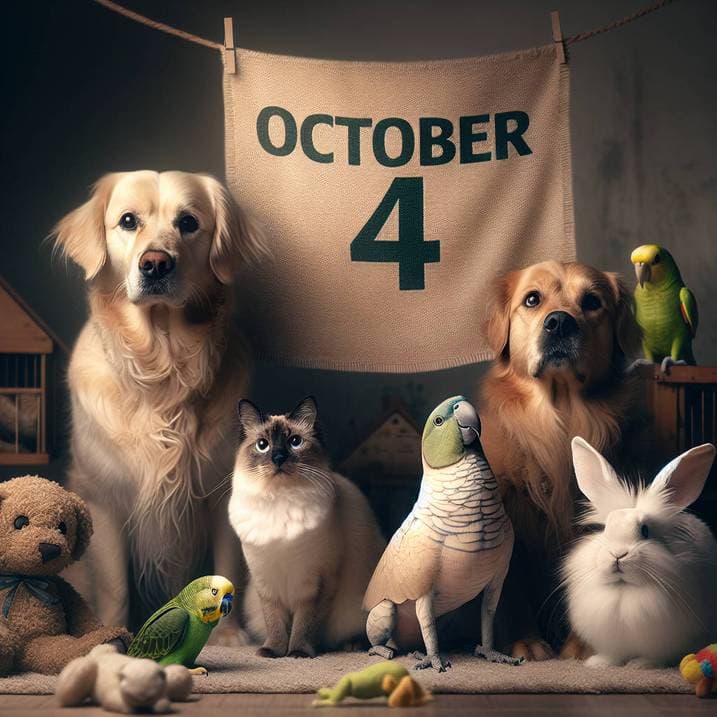World Animal Day: A Global Call for Animal Advocacy and Welfare

October 4 is World Animal Day
Published on: (Updated on: )
Every year on October 4, animal lovers, activists, and organizations around the world come together to celebrate World Animal Day, a day dedicated to raising awareness about the rights and welfare of animals. This year, events are being held across the globe, emphasizing compassion, advocacy, and education.
A Day of Awareness and Action for Animals' Welfare
World Animal Day was officially established in 1931, but its origins trace back to 1925 when Heinrich Zimmermann organized the first celebration at a convention in Berlin. The formal establishment of World Animal Day took place during a convention of ecologists in Florence, Italy, in 1931. The date of October 4 was specifically chosen to honor St. Francis of Assisi, the patron saint of animals and the environment, celebrated for his deep love and care for all living beings.
This year, many organizations are organizing activities to promote animal welfare, including educational workshops, community events, and fundraising drives for local shelters and wildlife conservation groups. Initiatives are also focused on addressing issues such as habitat destruction, poaching, and the illegal wildlife trade.
Campaigning for Change for Animals
Animal welfare organizations like the World Animal Day organization, the Humane Society International, and the World Wildlife Fund (WWF) are calling for stricter policies and legislation to protect animals from cruelty and exploitation. Campaigns this year underscore the importance of adopting pets from shelters, supporting cruelty-free products, and advocating for stronger regulations on factory farming practices.
"The plight of animals has never been more urgent," said Dr. Emily Carter, director of the Global Animal Advocacy Alliance. "World Animal Day is a reminder that we each have a responsibility to speak for those who cannot speak for themselves."
Engaging the Youth
Educational programs targeting youth are also a significant focus of this year's observance. Schools across various countries are hosting art competitions, essay writing contests, and discussions on animal rights. Through these initiatives, young people are encouraged to develop empathy and take action on behalf of the world's animals.
"We believe that educating the younger generation about animal welfare is crucial for fostering a kinder future," said Rachel Greene, an education coordinator at Animal Welfare Organization. "Instilling compassion will help us create a more just world for all living beings."
A Global Movement for Animals
World Animal Day is celebrated in countries around the globe, with various events tailored to local cultures and issues. From street fairs and pet adoption drives in urban areas to conservation efforts in rural regions, the day highlights the universal commitment to protecting animal rights.
As the sun rises today, millions of voices will unite in the pledge to improve the lives of animals everywhere, promoting a future where humans and animals coexist harmoniously. Whether through advocacy, education, or simple acts of kindness, World Animal Day serves as a powerful reminder of our collective responsibility to safeguard the planet's wildlife and domestic animals.
Controversies and Criticisms of Animal Rights Advocacy
While World Animal Day is widely celebrated and promotes awareness of animal rights and welfare, it is not without its controversies and criticisms. Here are some points of opposition or controversy related to World Animal Day and animal advocacy in general:
Commercialization
Some critics argue that events surrounding World Animal Day have become commercialized, detracting from the genuine purpose of raising awareness about animal welfare. They point out that sponsorships and commercial interests may overshadow the advocacy aspect of the day.
Inequality in Attention
Critics note that while some animals (like pets, especially cats and dogs) receive significant attention on World Animal Day, others—such as farm animals, wildlife, or animals used in research—often do not receive equal focus. This can lead to imbalances in advocacy efforts and funding.
Human-Animal Conflict
The promotion of certain animals can sometimes lead to conflict with local communities. For example, efforts to conserve wildlife can clash with agricultural interests when animals encroach on farmland, leading to debates over the best ways to balance animal rights with human livelihoods.
Cultural Practices
Some cultural traditions involving animals, which may include practices viewed as cruel by animal advocacy groups, can lead to tensions. This includes discussions about traditional festivals that involve animals or hunting practices that are deeply ingrained in certain societies. Advocacy groups may be seen as imposing Western values on other cultures.
Pet Overpopulation
While World Animal Day emphasizes the adoption of pets, there is also a controversy around the overpopulation of pets in shelters. Some argue that the focus should be more on responsible breeding practices, spaying, and neutering than solely on adoption to ensure fewer animals end up in shelters.
Diverse Views on Animal Rights
Within the animal welfare movement itself, there can be disagreements about priorities and approaches. For example, some advocates push for more radical change, such as a complete abolition of animal use, while others may focus on improving conditions for animals within existing systems (like factory farming).
Impact of Activism
Some animal rights activism, particularly in more extreme forms, has led to controversies concerning methods, such as direct action or disruptions that might inconvenience the public or put people at risk. Such actions can polarize opinions, even within the animal rights community.
Addressing Broader Issues
Some critics argue that discussions focused on animal welfare should not overshadow broader issues related to environmental sustainability and conservation. They contend that focusing solely on animal rights without addressing systemic issues can lead to ineffective or misdirected efforts.
Despite these controversies, World Animal Day continues to be an important platform for raising awareness about animal welfare and the need for compassionate treatment of all living beings. Advocacy groups often seek to engage with critics and address these concerns while continuing their work to promote welfare and protection for animals.